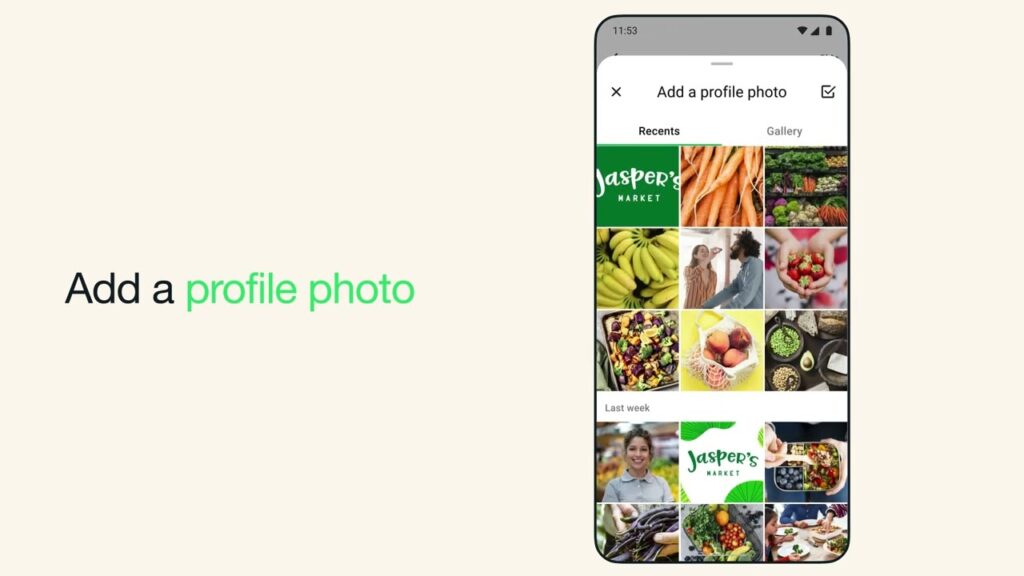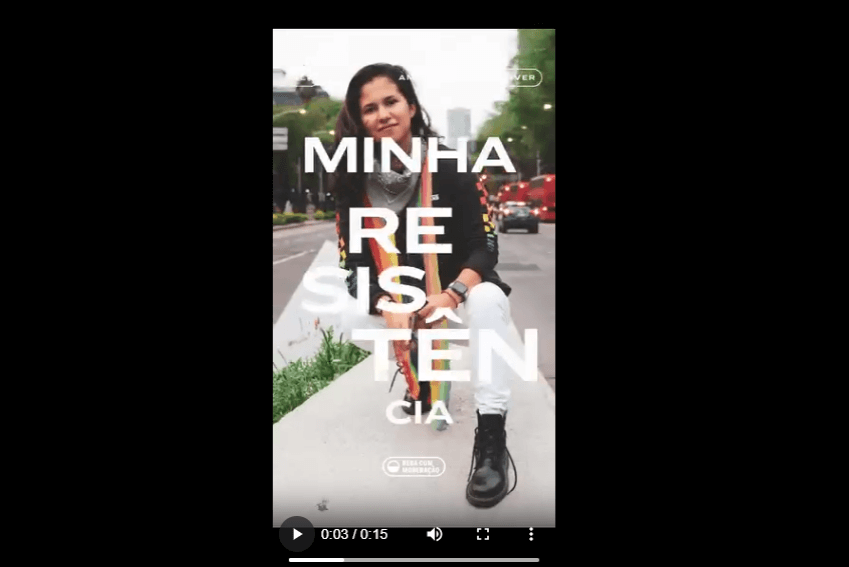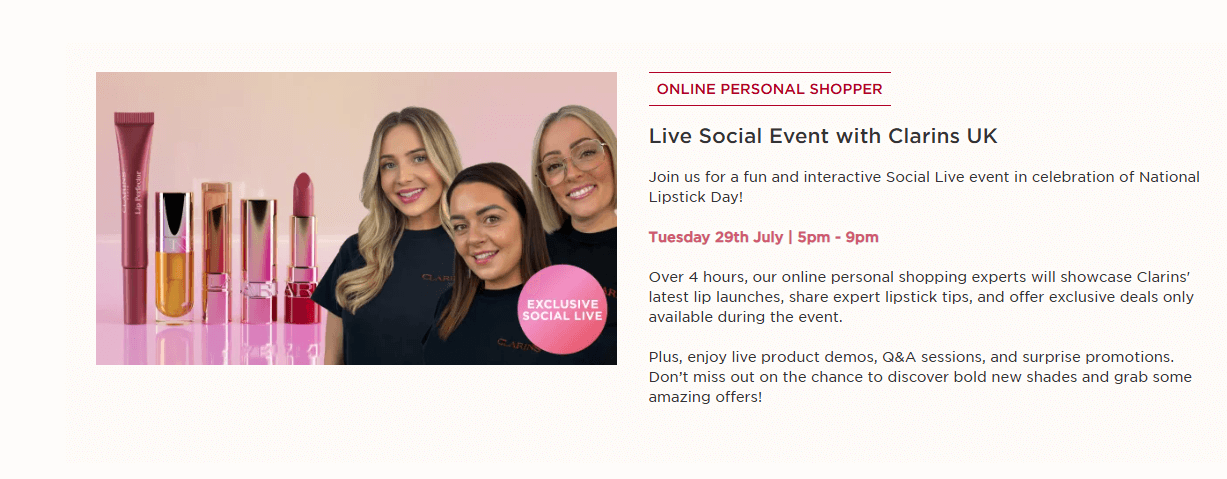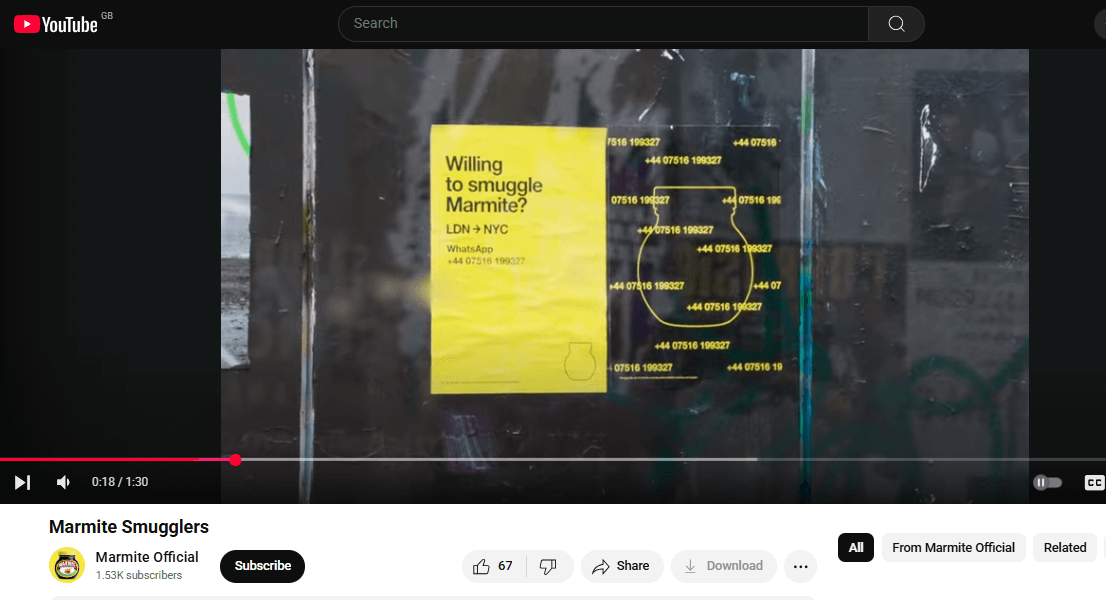Remember the feeling of “being a regular” somewhere? No customer experience can compare to spending money with a company that knows who you are and what you like.
In this era of digital transformation, the concept can feel like a thing of the past. But the truth is it’s not gone; it’s just changing shape. Stand-out customer experiences still hinge on creating that sense of familiarity and personalisation. Now, marketers can pull it off at scale with 1:1 messaging tools, like WhatsApp.
WhatsApp marketing taps into the preferences of today’s always-on, digital-first consumer. Not only is WhatsApp the most popular global messenger app worldwide, its number of monthly active users grew to over 3 billion in 2025, which is over a third of the world’s population. WhatsApp is more than likely where global brands’ customers connect with family, friends and maybe even your competitors.
Marketing with WhatsApp can modernize your approach to customer care, sales messaging and direct marketing. Keep reading to learn more about WhatsApp marketing and its role in your social media strategy.
How can WhatsApp be used for marketing?
As an instant messaging platform, WhatsApp allows businesses to communicate directly with customers. You can use WhatsApp as a direct channel to offer customers updates on orders, live sales notifications and other timely information. These direct channels can be automated further by integrating with chatbots and other tools. You can also use WhatsApp Channels to create a WhatsApp community centred around brand updates.
Brands can also use WhatsApp for creative marketing campaigns that encourage engagement from your audience. Approached effectively, these campaigns allow your customers to build stronger connections with your brand and your products.
Why use WhatsApp in your social strategy?
You’ve likely experienced frustration caused by an impossible-to-find support centre hotline. Or the boredom brought on by a seemingly endless customer service wait time.
These common customer experience pain points used to seem inevitable. Now, people can and will avoid them.
Your customers want to connect with businesses the same way they connect with their friends and family. No special hotlines or single-use platforms. Just fast, simple and convenient messaging.
WhatsApp marketing supports seamless customer experiences, encouraging retention and stronger affinities with your brand. If you’re still on the fence, here are four prime reasons you need to include marketing with WhatsApp in your social media strategy:
1. Personalised messaging
Customers can and will avoid disjointed customer experiences. In fact, consumers say brands should make personalised customer service their #1 social media priority in 2025, according to the latest Sprout Social Index™.
With WhatsApp, your brand can secure a competitive edge that makes a measurable difference on your bottom line. A WhatsApp Business account allows you to set up messaging tools that guarantee quick response times with less effort. When almost three-quarters of consumers expect a response in less than 24 hours, speed and personalisation are what will make your business stand above its rivals.
Improve your response times further by integrating your WhatsApp marketing with a tool like Sprout. Sprout’s WhatsApp marketing functionality connects WhatsApp to your other social media channels and review apps, allowing you to improve responsiveness across your entire social landscape.
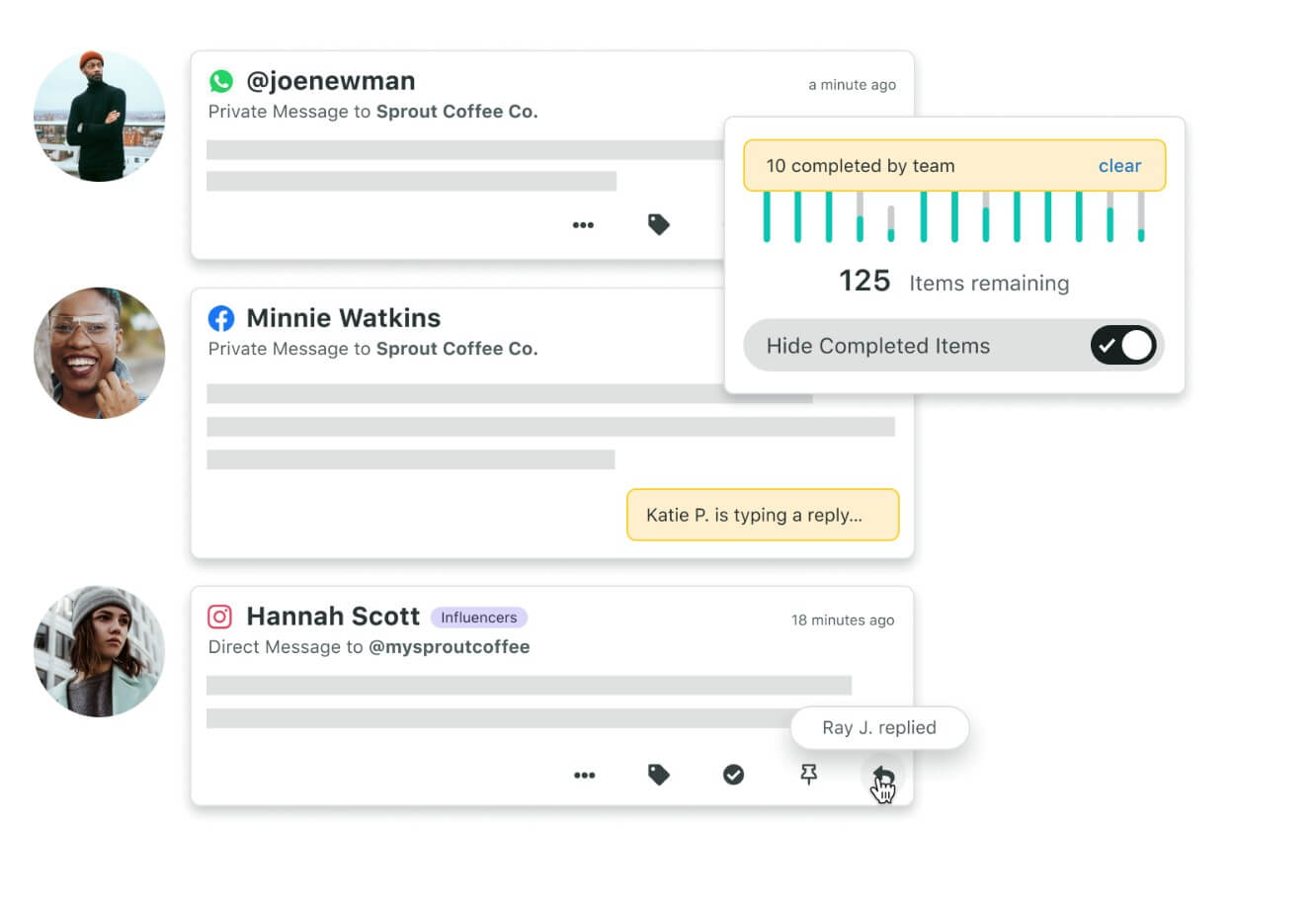
2. High engagement
WhatsApp marketing open rates are much higher than traditional email open rates. In fact, some estimates suggest open rates on the platform reach as high as 98%.
This responsiveness opens the door for more meaningful interactions that go beyond support requests. Now, customers are using social messaging to ask questions about products, provide feedback and give shout-outs. These behaviours empower your social media and customer care teams to act as digital sales floor associates, giving them real-time influence on purchasing behaviours.
This high engagement level is also important as it meets the demand for what customers expect from brands today. Sprout’s Q4 2024 Pulse Survey found that 40% of social users want brands to prioritise personalised customer service across social media channels.
3. Future of commerce
Social commerce has completely changed the way many people interact with and purchase from brands.
Social media has become the main discovery channel for new products. In the UK, 30% of people planned to increase their purchases from social media in 2025.
WhatsApp is a unique channel that can significantly strengthen a social commerce strategy. By using features like WhatsApp channels, subscription-based brands can build relationships with customers directly. You can also communicate last-minute deals to customers directly on WhatsApp, making it an effective channel for important dates like Black Friday.
It’s easily forgotten that selling is a form of communication. As today’s leading communication platform, WhatsApp can be the perfect place to sell, as long as you’re smart about your messaging.
4. New advertising channel for brands
Meta’s latest announcement regarding WhatsApp functionality has introduced adverts on the platform through a new Stories-like status feature. This is a major move in the platform’s development, and evidences Meta’s plan to encourage more direct advertising opportunities across WhatsApp in the future.
What’s notable is Meta’s intention for ads across WhatsApp to be non-intrusive and personalised based on user interests. WhatsApp marketing could therefore become a more significant part of social marketing strategies for brands that understand their audience, and who specialise in authentic brand-building content.
The 4 best WhatsApp marketing campaigns we’ve ever seen
If you’re planning to roll WhatsApp into your social marketing strategy, here are four brands you can look to for inspiration:
1. Amstel’s regional Pride Month success
European brewery Amstel used WhatsApp to support their regional Pride Month marketing efforts in LATAM. They created a unique user-generated content (UGC) campaign in Brazil by designing content that linked directly to WhatsApp.
Users were then encouraged to create their own “Yes, I Am” Reels and Stories. Amstel created an automated WhatsApp Business conversation where users could send videos, pictures and text. This conversation would then create a personalized Reel for users, which could be shared across WhatsApp and other social platforms.
The campaign reached 1.5 million people, with 65,000 messages exchanged across WhatsApp. It succeeded in furthering awareness around Pride Month across Brazil, and strengthened users’ relationship with Amstel.
2. Clarins capitalises on National Lipstick Day
French cosmetics giant Clarins also used WhatsApp to create a campaign centred around National Lipstick Day, targeting its previous customers.
Customers all received personalised messages which were designed to be both direct and conversational. When compared to an identical email campaign, Clarins’ WhatsApp efforts achieved a 90% open rate, 4.5X higher than emails. They also achieved 7X higher conversions on WhatsApp when compared with emails. They combined this WhatsApp campaign with other National Lipstick Day live social events across Europe.
Their campaign shows the importance of a well-curated content calendar and a deep understanding of an audience’s needs. It also proves how much more powerful WhatsApp marketing can be than emails or other forms of outreach, as long as campaigns are well-managed and carefully considered.
3. Marmite employs “smugglers” to strengthen UK and US markets
Unilever’s Marmite brand is a staple food product in the UK. Unilever used WhatsApp as part of an extensive digital marketing campaign to further this reputation, as well as to boost its presence in the US market.
The campaign involved “Marmite smuggling” – a tongue-in-cheek campaign encouraging UK expats to smuggle their own jar of Marmite into the US. Unilever created a unique WhatsApp number where customers could pitch to become a smuggler and get involved.
They then created print adverts and videos to further promote the campaign across both markets. The unique campaign worked firstly because of its clear audience focus, and its embrace of multiple different marketing channels, including WhatsApp as a direct communication tool.
4. Hyphenated People supports the UK’s booming WhatsApp Channels trend
In 2023, Meta introduced WhatsApp Channels, which allows brands and organisations to create a one-way communication channel with their audience on WhatsApp. It’s since been adopted by the UK government, news publications and football clubs among many other brands.
WhatsApp Channels are now coming into their own as a unique space for companies and influencers to build communities. UK ex-footballer and broadcaster Eniola Aluko launched her new organisation, Hybrid Peoples, exclusively on WhatsApp Channels and has already attracted over 50,000 followers in just two months.
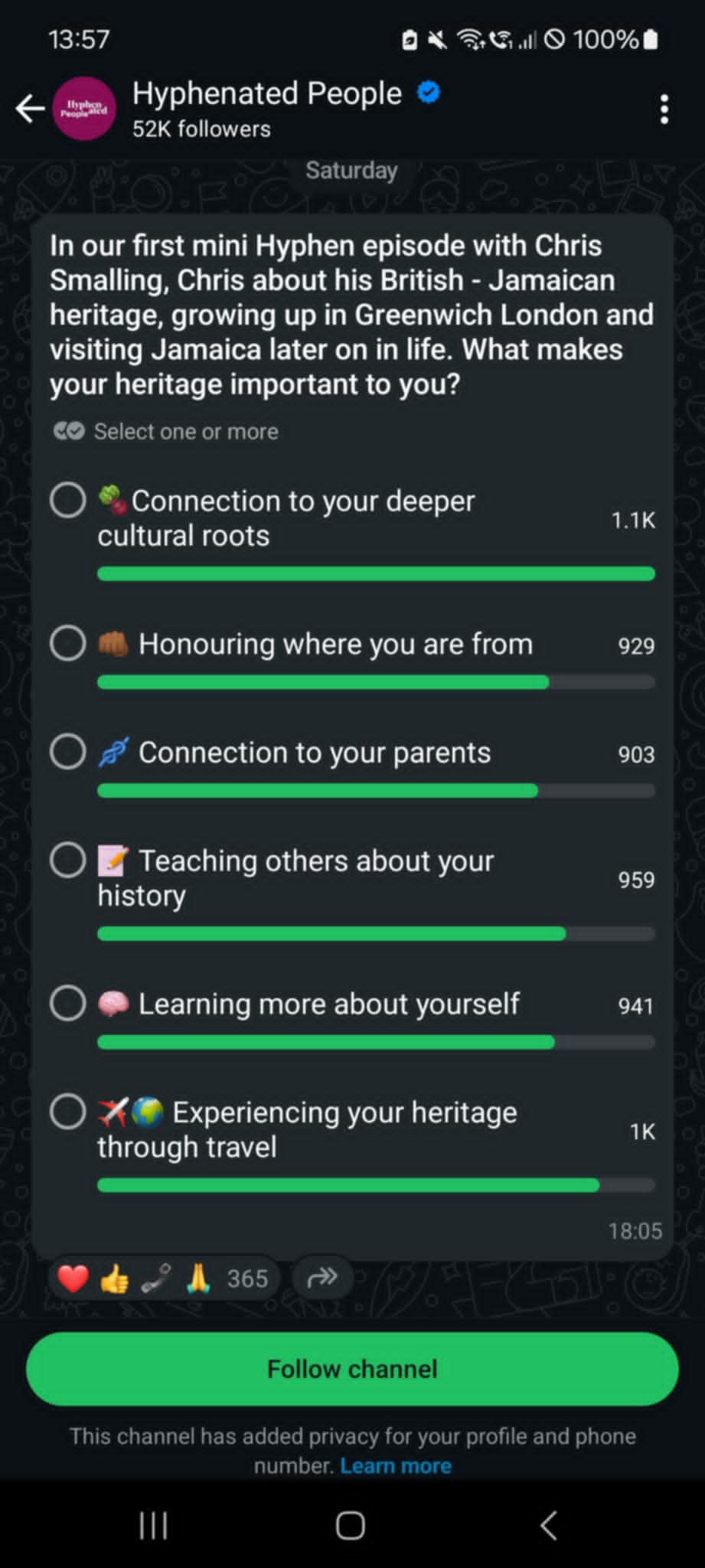
The channel is used to share videos, articles and other insights from people of multi-heritage backgrounds, and aims to build a new global community. It’s proof that WhatsApp has become a major platform—capable of serving as the primary channel for brands and organisations—and a powerful tool for building an engaged audience.
How to blend WhatsApp into your social media strategy
WhatsApp marketing isn’t a magical solution to connecting with your customers. A poor messaging conversation will drive a customer away just like a poor in-person experience might. Like all marketing strategies, you get what you put into it.
If you’re ready to start marketing with WhatsApp, here’s everything you need to do before jumping in.
Decide on your team goals and operating norms
Your WhatsApp marketing goals will be different from your goals for traditional social media networks. Instead of engagements and impressions, you’ll want to start by tracking customer care metrics.
KPIs like average reply time and total response volume can help you benchmark your initial WhatsApp marketing efforts. Eventually, you’ll be able to use that data to inform more commerce-driven channel decisions.
You’ll also want to use this time to decide on operating norms. WhatsApp Business accounts only allow for one active user at a time, so creating a clear channel management schedule is imperative.
Sign up for WhatsApp Business
You won’t run your business account out of the general WhatsApp app. Instead, you have to use WhatsApp Business.
WhatsApp Business is available for both iOS and Android devices. Once you’ve downloaded the app, you’ll see the account setup is pretty simple. All you have to do is verify your phone number and update your business information. For a full walkthrough, check out the video below.
Build a contact list
Once you’ve set up WhatsApp Business, start to build your contact list. Remember to get consent from everyone you communicate with on WhatsApp before you contact them.
Rules of engagement will differ depending on where your company is based, so make sure to read up on the laws in your particular market. Remember: If you’re operating internationally, you’ll also need to follow the laws of the countries you’re operating in, as well as your home country.
Craft templated messages
WhatsApp Business offers several messaging tools to streamline your workload and customer response times. All you have to do is craft your message.
These templated responses are designed to help you act on important conversations in advance. WhatsApp’s messaging tools include:
- Away message: When an away message is enabled, customers who message you will automatically receive a reply indicating that you’re busy or offline for the day.
- Greeting message: Your greeting message automatically sends out a warm welcome when customers interact with you for the first time or after 14 days of no activity.
- Quick replies: These canned responses can be used to quickly reply to frequently asked questions. They can be accessed in message conversations using specific shortcuts and you can save up to 50 at a time.
Build out a product catalogue
The catalogue is a powerful WhatsApp marketing feature that allows customers to browse through your products or services directly within the app. Once a product is in your catalogue, you can share its link anywhere for more discoverability.
If you offer several products, try starting with your most popular items. As you continue to build out your product offerings on the app, you can sort them into collections for easy browsing.
Promote your presence on other channels
WhatsApp isn’t an “if you build it, they will come” platform. Customers need to know your WhatsApp number to reach out.
Once your business profile is all set up, run a lightweight awareness campaign to let people know you’ll offer customer care through the platform. This might include an email to existing customers, promotions across other social media networks, and a quick update to your website’s “Contact Us” section.
The further you promote your WhatsApp, the easier it’ll be to build a larger contact list over time.
Consider integrating WhatsApp with other social channels
To get the most out of your new WhatsApp account, integrate it with your existing social media accounts. By adding WhatsApp to Sprout, you can easily connect it to all your socials so you can manage everything from a single interface.
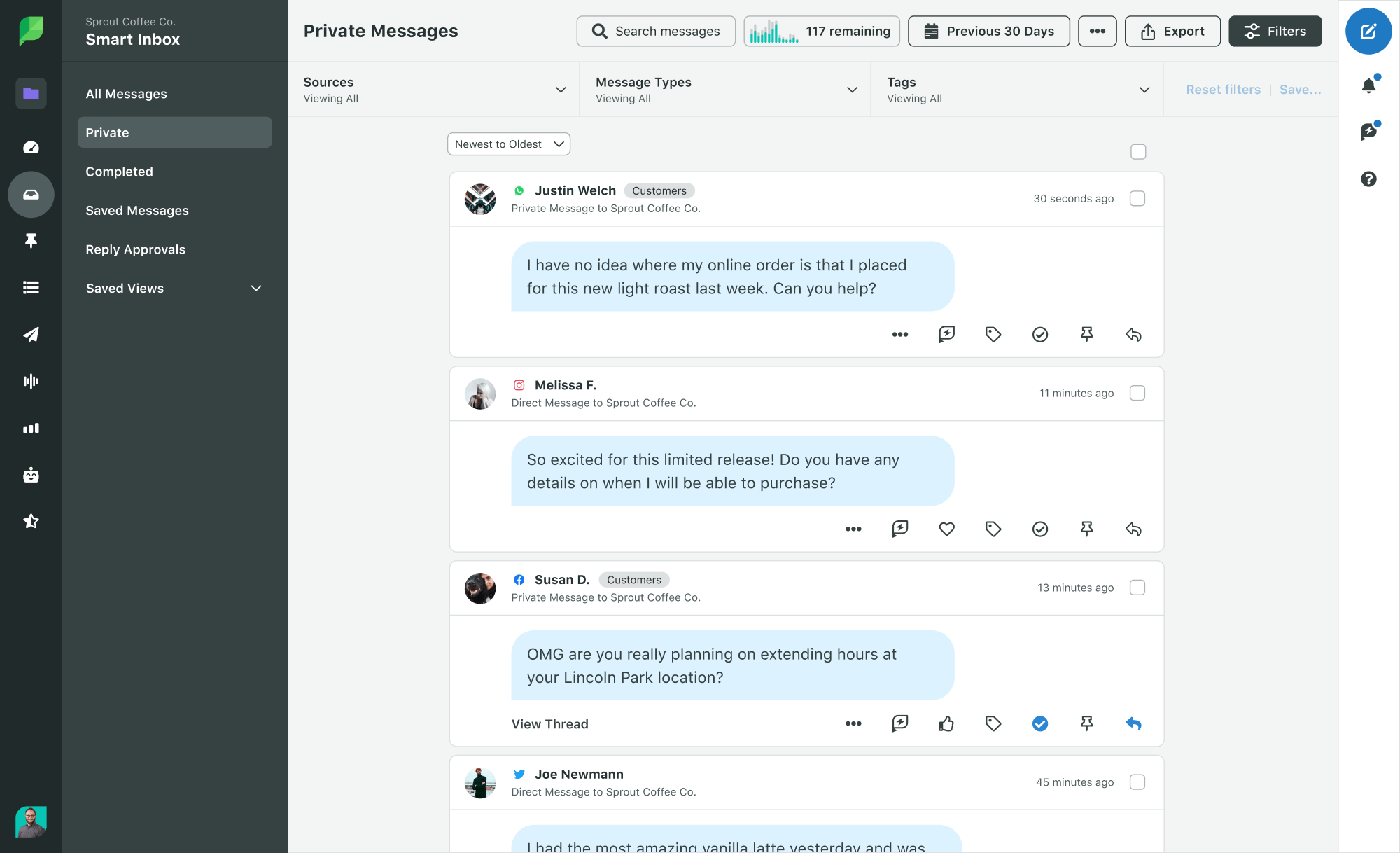
You can then pair your WhatsApp account with Smart Inbox to streamline your inbox management. Sprout’s in-built analytics reports also give you data on your WhatsApp channel’s performance, which you can use to refine and improve it in the future.
Say “what’s up?” to WhatsApp marketing
Marketing with WhatsApp sits at the intersection of marketing and customer care, opening up new ways for brands to connect with fans and prospects alike. If your approach to messaging is more reactive than strategic, now is the time to use WhatsApp Business to step into the new normal.
Success on WhatsApp demands creativity, consistency and an understanding of what sets the platform apart. Learn more about how you can use WhatsApp to connect and convert customers in our guide to WhatsApp marketing software.
The post Everything you need to know about WhatsApp marketing appeared first on Sprout Social.

